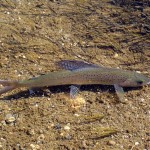
The Michigan Department of Natural Resources, in partnership with the Little River Band of Ottawa Indians, has announced a proposed initiative that aims to bring back Arctic grayling, an extirpated species to the state.
The proposed initiative seeks to establish self-sustaining populations of Arctic grayling throughout its historical range. The initiative is a proposed objective in the DNR’s 2017 Inland Trout Management Plan, which currently is being drafted.
The Arctic grayling is a native and iconic fish species in Michigan. Slate blue in color, they have a sail-like dorsal fin and were virtually the only native stream salmonid in the Lower Peninsula. In the lower 48 states, Arctic grayling are native only to Michigan and Montana.
Michigan’s native grayling population died off nearly a century ago due to statewide logging efforts of the 1800s, over-fishing, and general habitat destruction.
Previous reintroduction efforts have occurred as recently 30 years ago. While unsuccessful at that time, lessons were learned and significant strides have been made to establish a better strategy to move the initiative forward.
Steps will include identifying interest and abilities of the partners, collecting baseline data, initiating the building of broodstock, and stocking efforts. The Manistee River watershed, once known as a premier grayling river, will be the first targeted location for reintroduction.
The DNR will work closely with partners as the proposed Arctic grayling initiative moves forward. The Little River Band, located in Manistee County, has for several years been engaged in extensive research for potential grayling reintroduction.
This effort also will lean heavily on recent scientific research in Michigan, as well as the successes Montana has achieved in re-establishing stable Arctic grayling populations.
source: Michigan Department of Natural Resources